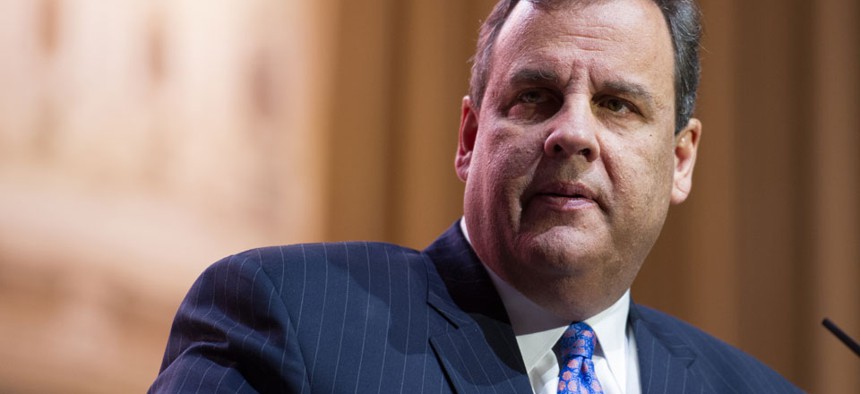What’s Chris Christie Doing in the Middle of the Ebola Crisis?

Christopher Halloran / Shutterstock.com

Connecting state and local government leaders
The New Jersey governor operates best in a crisis. And if he’s looking for a boost ahead of a possible 2016 run, this could be his chance.
The latest case of Ebola in the United States is in New York City. So why does Chris Christie want to quarantine people in New Jersey?
There are a few practical reasons. For the New Jersey governor's constituents, New York City is just one short car, train or ferry ride away. Nearly 400,000 people commute from New Jersey to New York every day for work. The Port Authority, which operates a bustling network of bridges, tunnels and airports, including Newark Liberty, John F. Kennedy International, and La Guardia, is a joint venture between the two states.
Other reasons, not surprisingly, are political. An Ebola case close to home creates a special opportunity for the Republican possible presidential hopeful. By imposing strict quarantine policies on Ebola health workers returning home, Christie can demonstrate—very publicly— the way he tackles national concerns, all from his office in Trenton.
And if it works out, the governor can tack it onto his crisis-management resume, right under "Hurricane Sandy," to use for a potential presidential run.
Sure, other likely 2016 GOP contenders have also weighed in on Ebola this fall. Kentucky Sen. Rand Paul has said that travel restrictions for people flying into the U.S. from Ebola-stricken West African nations are "reasonable," and that an outright ban "ought to be considered." Texas Sen. Ted Cruz has been more forceful, saying that President Obama's "biggest mistake" in responding to the threat has been not suspending commercial flights between the U.S. and West African nations. But there's not much else Paul and Cruz can do to contribute to response efforts until after the midterms.
Texas Gov. Rick Perry has criticized the Obama administration too, but his own state government is the one taking some heat now, thanks to the way Texas handled the nation's first three Ebola cases this month. Perry has since admitted that health officials made "unacceptable" mistakes.
Like other Republicans, Christie mounted an anti-establishment message to domestic Ebola cases even before the virus arrived in New York. "If I become discontent" with federal response efforts, he said, a day before Spencer was diagnosed, "I will take whatever steps are necessary to protect the public health of the people of New Jersey, and if someone wants to sue me over it, they can."
The latest case gave Christie the chance other Republican contenders haven't had: following through on that message. "I did not let them know," Christie told The New York Times on Sunday, about not consulting the White House on his decision to impose new quarantine rules for travelers coming to New Jersey.
But by going up against the Obama administration, Christie is clashing with top medical experts at the Centers for Disease Control and Prevention and the National Institutes of Health, who say New Jersey's new quarantine policies are unnecessary.
The state's three-day quarantine of Kaci Hickox, a nurse who treated Ebola patients in Sierra Leone, garnered Christie a lot of attention over the weekend, and none of it good. Her case suggests that the governor's refusal to back down from the White House and critics could backfire, no matter his past crisis management experience.
Still, of the 2016 Republican hopefuls, Christie may have the most to prove. His popularity in New Jersey has steadily decreased since the January traffic scandal dubbed "Bridgegate." A Quinnipiac poll earlier this month put his approval rating at 45 percent, its lowest since 2011. The bridge fallout led the governor to keep a low profile during spring and summer, and he has only recently emerged, stumping for Republicans in Iowa and other states ahead of the midterms. A case of Ebola in New Jersey's backyard calls for some emergency management, which is a virtual bat-signal for Chris Christie.
A month after Hurricane Sandy, Christie's approval rating in New Jersey shot up from 48 percent to 67 percent. The governor's response to the natural disaster was praised by both Democrats and Republicans, and pushed Christie squarely into the field of 2016 Republican hopefuls. Christie's involvement in the Ebola crisis presents a chance to recreate the political success of the last crisis.
And so the governor, not one to do so, has wasted no time. It took just 24 hours after the diagnosis of Craig Spencer, a U.S. health worker who treated Ebola patients in Guinea, became public before Christie, along with New York Gov. Andrew Cuomo, announced new protocols for monitoring and quarantining others like Spencer.
Christie has already adopted the "better safe than sorry" rhetoric of his Sandy response. "I don't think when you're dealing with something as serious as this you can count on a voluntary system," he said on "Fox New Sunday" about asking people to self-quarantine for 21 days. "This is the government's job."
In other words, the Christie administration knows best now—just like it did in 2012. "I know there will always be people...who are always smarter, and because the damage in [Hurricane] Irene was less to the barrier islands, they're saying to themselves, 'Well, see he was wrong the last time,'" Christie said back then, referring to residents who decided to remain in New Jersey's barrier islands during Sandy, which was stronger than Hurricane Irene in 2011. "I turn out to be right and you turn out to be dead—that's not a great equation."
So far though, Christie isn't earning Sandy-esque accolades. Hickox, who was released Monday, took up the governor's earlier suggestion, and plans to sue.
(Image via Christopher Halloran / Shutterstock.com )





